Kevin Harper opens up on being Hibs derby hero, management struggles and ongoing fight against racism
Those newspapers scattered around on tables carry reports of the fallout from Robbie Neilson’s departure at Hearts. Tynecastle chief executive Andrew McKinlay has reported that he was “inundated” with notes of interest within half an hour of the news emerging.
In view of his history for Hibs against Hearts, including twice starring in memorable derby day victories, one of them 25 years ago this week, it's hardly surprising that Harper’s CV was not among those landing in McKinlay's in-box. But there’s barely been a post in the lower tiers for which he hasn’t applied since turning down the offer of a new contract with Albion Rovers, having preserved their league status two seasons running against the odds. The net result so far has been one face-to-face interview.
Advertisement
Hide AdAdvertisement
Hide AdThe obvious question is why, knowing what he already did about Scottish football’s tendency to stick with the tried-and-tested, did he willingly turn down the opportunity to continue at Cliftonhill in 2020? He'd done a more-than decent job since taking over from John Brogan when the side were sitting plum last in the Scottish League (where they are now incidentally). And yet he was offered lower terms.
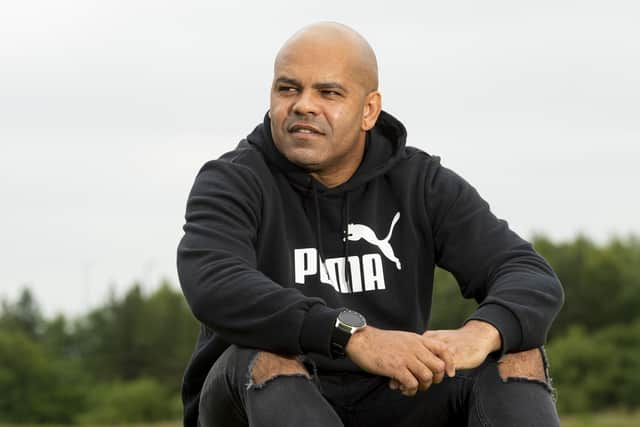

“It wasn’t as if I was saying I want X-amount, a huge sum of money,” Harper explains. “I knew I would not get that. Ultimately, I wanted a fair reflection for what we were doing and what we were trying to build. I have no desire to bad mouth anyone there because I do not have that option – they took a decision on where they want to go. You move on. Did I think at this point I would be back in? Yes."
In the meantime he is concentrating on Kevin Harper Coaching, his own coaching school. "I apply for all jobs," he says. "At the end of the day I feel I have something to offer. I don’t think you can say I was not a success at Albion Rovers.” He cites Kevin Thomson, another former Hibee who walked away from a job, in his case League Two champions Kelty Hearts. “You look at Tommo,” says Harper. “He has not been back in. You wonder what the reason for that is. I have no idea. Is it because he walked away from the club, and he did not get sacked? And yet you have other managers who get sacked from a job and walk into another job. Are Tommo and I too outspoken? Or do they just feel there’s a better fit? It could be multiple things ...”
Even now, in 2023, it is still not easy for anyone a bit different, a bit outspoken and … well, in Harper's case, a bit black to get onboard, albeit Marvin Bartley is now striking a blow for those fighting against such prejudice at Queen of the South. Harper welcomes this. “But it shouldn’t be a club chairman looking at Marvin Bartley at Queen of the South and thinking, yes he is doing well, I am going to offer the job to another black manager,” he says. “You should be choosing on the way the club think, not on colour. What we don’t seem to have in Scotland is any movement trying to get black and ethnic coaches into the game. I don’t know if we have. I know England has, because I have been offered roles through that.”
One was working with a club's Under-9s age section, another did not make it worthwhile uprooting his family. But the Professional Player to Coach scheme, a joint programme from the English PFA, the Premier League and the EFL, is a proactive step designed to increase the number of black, Asian and minority ethnic players transitioning into full-time coaching roles. “Why can’t we do that?” he asks.
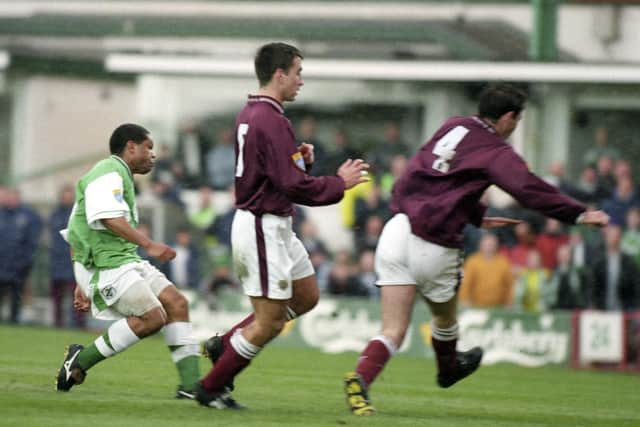

Now 47, he knows he has sometimes been his own worst enemy. “There are times when I have not covered myself in glory, like everyone,” he says. “You learn and become a better person. Is Kevin Harper the same person as five years ago, the same person as he was ten years ago? 25 years ago? No. I have learned that things that affected me back then don’t affect me now. I can deal with them better now. You have to put your head above the parapet. If I don’t get another management job, I can look back on Albion Rovers and say that, ultimately, it’s very possible that I saved that club from extinction.”
It wasn’t strictly speaking his last spell as a manager (if you don't include his current role coaching West Park United Under 10s, his own old club, and where his eight-year-old son Franklin now plays). East Regions Midland League side Lochee United appointed him last year and then changed their mind five days later. Harper was on the way to play in the Hanlon Stevenson Foundation charity match at Easter Road when he heard the news. He had already taken two training sessions. That matter is set to go to a tribunal next month so a more detailed discussion is off limits here. But it’s still permissible to report that he left the scouting post at Hibs he had started six months earlier to get back on the managerial ladder in Dundee. It makes what unfolded over a few short days in November even more regrettable. “It will all come out in the wash,” he says. When he got back in touch with Hibs to explain what had happened, he was told they'd moved on.
-------------------
Harper is used to kicking against the pricks. He's used to hardship. He's also endured his fair share of tragedy. The marks on his arm are not the type one might expect from someone who grew up in the streets of Glasgow's Possilpark, where drugs were and are still rife. It was the toughest of tough environments for anyone, let alone a black incomer – he was born in Oldham – with two white parents. His stepfather died nearly 20 years ago. He is no longer in contact with his mother. “Sometimes it seems like the going is just too rough/And things go wrong no matter what I do/Now and then I feel like life is just too much/You’ve got the love I need to see me through.”
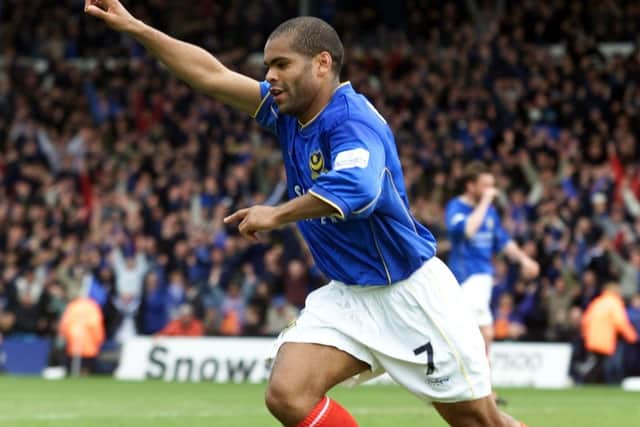

Advertisement
Hide AdAdvertisement
Hide AdThis affirmation is tattooed on his arm. Some might recognise these lines as the second verse of You’ve Got the Love by Candi Staton and The Source. The song came on the radio when he got back into his car while blinking back tears after hearing the news that Michael Duke, his goalkeeper coach at Albion Rovers, had died on the weekend of a 1-1 draw against Berwick Rangers. The result had been viewed as a big chance blown to gain ground on the team directly above them. But Duke texted Harper at midnight to reassure him. “Listen gaffer, we keep what we are doing there’s no chance we will go down, keep the faith!” Duke passed away that night aged 37.
The team had already improved markedly but now failure was not an option. “Berwick had scored with about nine minutes to go,” recalls Harper. “It was probably the day they thought they would stay up.” Albion Rovers were seven points adrift at the time but were now galvanised. They finished eight points clear of the dreaded ‘Club 42’ spot, with Berwick Rangers then losing to Cove Rangers in the League Two play-off final (they remain marooned in the Lowland League).
“God has got you, that is how I interpret it,” says Harper, of the lyrics. He is a practising Catholic but admits his faith has wavered on occasion, including when another death of someone close to him shook him to the core. He was a younger man, based hundreds of miles away from home on the English south coast at Portsmouth, when he heard Andrew Dolan, his best friend, had died after a long-term heart issue at the age of just 34. He admits he was not well qualified to deal with this awful development. But he’s always persevered. He started one season being booed and ended it being cheered to the old Fratton Park rafters. He came of age at Portsmouth, where he remains a cherished former player. "I was invited back down there last season and was on the pitch with my son," he says. "It was good to feel the vibes again from the fans."
Surprisingly, he describes his Derby days as disappointing. Surprising because this writer can recall being hurriedly sent down to the Midlands to interview him in the hotel he was staying in at the time. The reason? He’d only gone and scored on his full debut at the Kop end at Anfield as Derby shocked Liverpool with a 2-1 win in November 1998. He told another interviewer he wasn’t even aware of the significance of the end at which he had sent a header – although 5ft 6in, he was always dangerous in the air – beyond David James. “That was just naivety and not understanding the history of football. I played football because I loved football. It wasn't about playing in stadiums and that kind of stuff.”
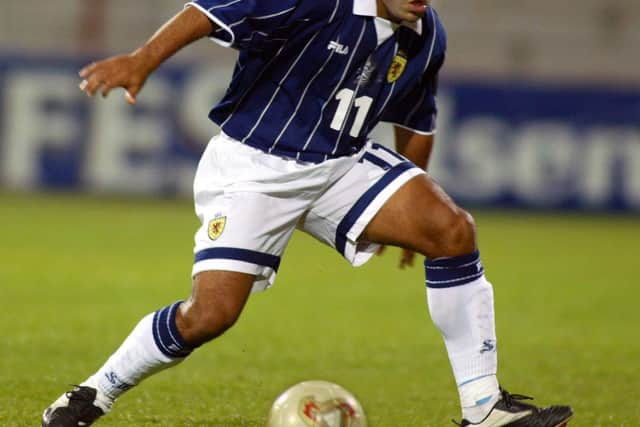

It’s Hibs where he perhaps established the deepest connection. He regrets the "night flit" nature of his departure to Derby to this day. The original bond between him and the club was established after Alex Miller heard a commotion coming from an adjacent pitch while watching his own son play. Harper was tearing it up next door. “It was the Fifty Pitches in Paisley, obviously I was doing my thing!” he says.
After his brief spell working as a scout at Hibs, he knows the extent to which a footballer's breakthrough moment can be down to fate. “For a manager of a professional football team to take the time to come through from Edinburgh to my house to speak to me and my mum to talk about the pathway was big for me," he says. "Alex Miller will always have a huge place in my life.” Miller even chose to overlook his car radio stolen while he was having those initial talks with Harper and his mum. Celtic and Spurs were also on the youngster's trail. “But I knew I’d get into the first team quicker at Hibs,” he says.
And he did. Which meant he made history. He was just 17 when he made his debut against St Johnstone in 1993. He was the first black player to play for the Easter Road club. He developed a handy habit of getting one over on Hearts. “My first one was the one we won 1-0 to end their 100-game unbeaten streak, or whatever it was!” he says.
His first goal against them was on New Year’s Day, 1996. "The game before we had been beaten 7-0 by Rangers. We had been 2-0 down at half time and I came on – I was just coming back from a hamstring injury – and obviously changed the game! In the opposite way. I remember going into the Hearts game and Neil Pointon scored early on. I took the ball back to the centre circle thinking, 'oh my word, what is happening here?' They also missed a really good chance. Michael O’Neill scored a great header. My moment came from a free kick. Darren Jackson took it up to Ted (Keith Wright) and Ted knocked it back. I hit it sweet as a nut. The keeper was never getting there. New Year’s day, against your rivals. It does not get any better than that.”
Advertisement
Hide AdAdvertisement
Hide AdPerhaps not. But coming on as sub and scoring a solo goal from nearly your own half to win the game for bottom-of- the-table Hibs against the title-chasing local rivals must come close. That one was 25 years ago, almost to the day. “I was not scared to use my so-called weaker left foot, I was two-footed," he reflects. "I was quite happy going on my left. When you run at players they tend to show you on to your less good foot, which is what happened. And I had the pace to get through.”
He was a star in the making, a Scotland cap seemed guaranteed. A perfect hat-trick for the Under-21s against Finland made it seem like only a matter of time until he was making history again – this time as Scotland’s first black international since the late 1800s. He once made the memorable assertion that Kevin Harper failing to win a cap for Scotland "would be a disaster for Kevin Harper – and Scotland". And so it turned out. His old Portsmouth teammate Nigel Quashie became the trailblazer instead. It’s still hard to explain Harper’s lack of opportunities, certainly on talent alone.
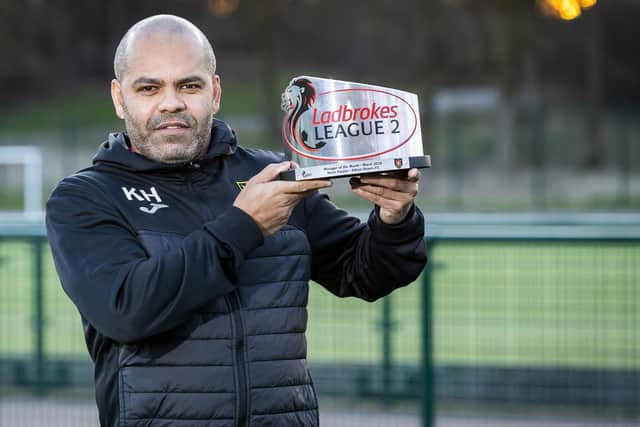

Berti Vogts did name him in a couple of squads but he was not pushed into action. So near, yet so far. Why? Were darker forces at work? He shrugs. “I’d like to think this was not the case, but when you speak out about an association or a hierarchy there are ways and means of stopping you,” he says. “I didn’t think they had done enough with regards racism. I felt they had swept it under the carpet.
“I had been racially abused in games with fans and the SFA didn’t really do anything. When you look back, they didn’t know what to do with the Mark Walters incident, and that was horrific. And they did not know what to do with me. It was easier with me, being a young kid. I look at it now and I still think they don’t know what to do. We are talking about 30 years on.”
Nothing can be done about the cap snub now. But what about the deadlock with his mother, Kathleen? When The Scotsman last caught up with Harper, nearly ten years ago, he revealed that he and his mum had fallen out and were not speaking over a lack of information about his birth father, who died when Harper was six months old. It's still the case now, he confirms. She has not met either of his younger children, Franklin and Pollie, three. “My wife (Helaine) phoned: I am paraphrasing here, but she said: ‘Kevin knows I am phoning you, do you want to meet up’?’ She said I will have to think about it and never got back. I don’t see the point in going over old news."
One battle remains ongoing. "Racism is something speak about a lot because it is something I don’t think has changed and we have to try and change it," he continues. "But ultimately the powers-that-be have to have the desire. If not, how do we change things?”